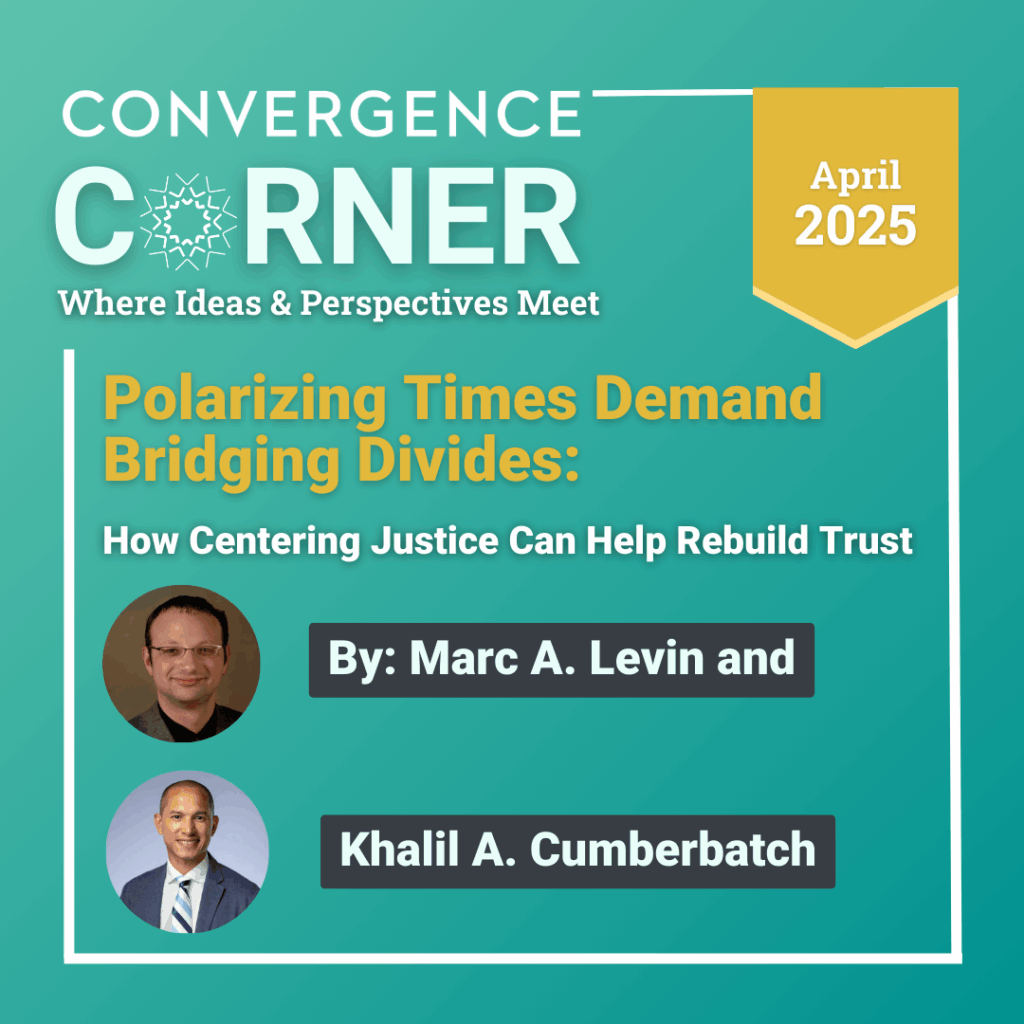We are thrilled to present this perspective from Marc A. Levin, chief policy counsel for the Council on Criminal Justice and Khalil A. Cumberbatch, the Council’s director of engagement and partnerships.
Together, they lead Centering Justice, a collaborative project engaging a diverse range of the nation’s top thinkers and doers in an ongoing, ideologically vibrant conversation about criminal justice policy. The Council’s CEO, Adam Gelb, participated in the Convergence Reentry Ready Project.
Interested in sharing your perspective on how we can better solve problems together? Message us here on LinkedIn or contact us at: https://convergencepolicy.org/contact-us
It’s no secret that we live in a time of deep polarization, distrust, and ideological division. From criminal justice policy to broader governance, many disagreements have hardened into gridlock, making constructive dialogue increasingly rare and difficult.
In this climate, finding common ground on public safety issues is more challenging than ever. Yet, amidst this growing divide, efforts like Centering Justice and organizations like the Council on Criminal Justice offer a path forward, not by ignoring differences but by embracing the power of principled dialogue and shared values to produce public good.
The fractures of mistrust are evident in many aspects of American life. Across political and ideological lines, people question institutions, the fairness of our justice system, and whether meaningful reform is even possible. Public safety conversations often become binary: “tough on crime” versus “decarceration,” “back the blue” versus “defund the police.” The truth is, neither extreme provides the full picture, and neither approach fully addresses the complexity of justice, accountability, and rehabilitation.
Centering Justice exists to bridge the divide in the criminal justice policy arena by fostering conversations grounded in data, lived and professional experience, and bipartisan principles. We believe that justice should not be a partisan issue, but rather a shared commitment to ensuring public safety, fairness, and second chances. Much like the work of Convergence, which brings people together across ideological, sectoral, and experiential gulfs to solve big policy challenges, Centering Justice seeks to move people beyond entrenched positions and foster practical, durable dialogue.
A nonpartisan, solutions-focused approach is the key to breaking this cycle. Through Centering Justice, we convene voices from across the ideological spectrum—law enforcement, policymakers, formerly incarcerated leaders, researchers, and victims’ advocates—to focus on what works rather than what divides us. This year, we’ve held three live online discussions, one examining the use of clemency, including pardons, commutations, and reprieves; a second exploring the implications of the flurry of presidential actions by the Trump administration; and a third on second chances and reentry. We’ve also launched a video series to showcase diverse viewpoints on key issues of the day.
The Council on Criminal Justice was launched with the goal of consensus at its core, serving as a space where people of good faith can engage in tough conversations without fear of ideological purity tests or partisan posturing. This approach does not ignore differences; it acknowledges them and finds a way forward based on shared values of accountability, safety, and justice.
Bridging ideological divides is most meaningful when it results in concrete, actionable change. As such, Centering Justice is not just about nurturing healthy conversations—it’s about driving policy solutions that command broad support. That means:
- Engaging communities to ensure that justice policies reflect their needs and experiences
- Bringing together reform advocates and law enforcement to identify strategies that enhance safety while upholding civil rights
- Using data-driven approaches to evaluate what works and ensure that reforms are evidence-based rather than ideologically driven
- Encouraging bipartisan commitment to justice policies that prioritize second chances, public safety, and procedural fairness.
This effort, and the work of like-minded organizations such as Convergence, is more important now than ever. Mistrust and division cannot be allowed to stall progress on issues that affect every community—rural, urban, conservative, liberal. A justice system that commands public trust, promotes safety, and upholds fairness is a goal that transcends ideology.
By centering justice, we are not just reforming policies; we are rebuilding faith in institutions, creating pathways for redemption, and ensuring that justice remains a shared, unifying principle. As Americans, we inherited democratic institutions, constitutional rights, and a commitment to pluralism that we haven’t always measured up to. Only through building bridges strong enough to sustain our shared principles can we uphold our nation’s best traditions and highest aspirations.



